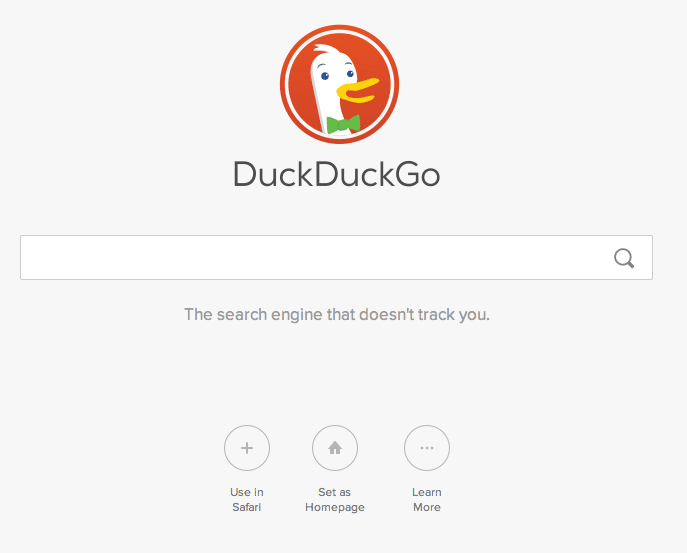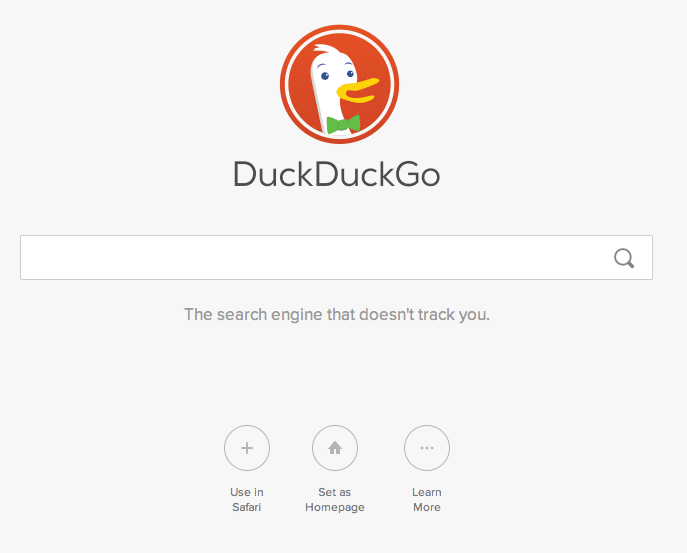
UPDATE: On September 9, 2014, Apple announced the release of the iPhone 6, the highly anticipated new generation of the iPhone. When the iPhone 6 is released on September 19th, the device will run on Apple’s new operating system, iOS 8 (launching on September 17th). One key feature of iOS 8 is the ability for users to set DuckDuckGo as their default mobile search engine. With Apple’s inclusion of DuckDuckGo, the search engine will be exposed to millions of new users, making it very important for SEOs to keep on our radar. New DuckDuckGo features, in addition to those listed below, include a customizable interface and !Bangs, which allows you to search other sites from the search engine.
From a consumer standpoint, DuckDuckGo, the search engine that emphasizes privacy above all else, is the ideal option for search. Unlike other search engines, namely Google, DuckDuckGo does not track or store IP addresses or log user information. The site claims to be completely secure, and search results are not filtered by preferences, search history, location, or any other identifying data. This means that everybody sees the same results for a search query, with is intended to preserve the quality and relevancy of results.
Furthermore, DuckDuckGo pulls its results from what it claims to be the best sources as opposed to the most. Yandex, Wikipedia, Yahoo!, Wolfram Alpha, Bing, and about 50 other sources including its own web crawler (DuckDuckBot) comprise the search engine’s sources. The site also filters websites with excessive advertising and “content mills” with high volumes of thin, low quality content.
This past May, DuckDuckGo unrolled a newly redesigned version that boasted a slew of new features, including:
- Images and videos
- Local search
- Smart answers
- Recipe search
- More meanings for ambiguous terms
- A sleeker and more user friendly interface
History
DuckDuckGo has been around since 2008, when founder Gabriel Weinberg set out to find an alternative to spam in search results. If the search engine is nearly six years old, why is this something SEOs should now be paying attention to? As an emerging trend in search, DuckDuckGo is something you should always have on your radar, although it is recently that the search engine has gained massive traction.
[Tweet “As an emerging trend in search, DuckDuckGo is something you should always have on your radar”]
Search Engine Land reported last week that things are going “swimmingly” well for DuckDuckGo. In 2013 alone, the platform saw 1 billion searches, a tremendous spike in activity that many attribute to the scandal surrounding Edward Snowden. Once the former NSA employee blew the whistle on the government’s top-secret PRISM surveillance program, people became obsessed with protecting their privacy and avoid tracking.
Market Share
Within days after the PRISM story broke, DuckDuckGo nearly doubled its total number of searches to ever come before, and while the spike has tapered off, the search engine continues to see sustained growth. Another huge boon to DuckDuckGo’s success came in June, when Apple unveiled that it would make DuckDuckGo available as a search option for users in its forthcoming iOS 8 and OS X Yosemite, demonstrating a further move towards an emphasis of private search.
While DuckDuckGo still receives only a small fraction of Google’s daily (let alone, monthly) traffic, the site continues to grow. It is still making headlines, as argued by a July 2013 Search Engine Land article and reaffirmed by the recent announcement from Apple. It may be a while before DuckDuckGo constitutes a viable threat to Google, but it is nonetheless a site that SEOs should keep an eye on.
[Tweet “DuckDuckGo’s privacy model just goes to prove that, at the end of the day, good SEO is good SEO.”]
If anything, DuckDuckGo’s model rewards the refocusing of SEO best practices to emphasize relevant links, great content, and strategic keyword targeting. FAQ pages are conducive to the site’s smart answers feature, and so are mentions from other relevant and reliable sites. One interesting tip that Forbes offers in its “5 SEO Tips for DuckDuckGo” is to link to Wikipedia. These are generally considered to be quality links, although Wikipedia is also one of the primary sources from which DuckDuckGo pulls its results, which makes it even more relevant to optimizing for this search engine. But essentially, if a site ranks well on another search engine, it will also rank well on DuckDuckGo—it just won’t appear in the top rankings as a result of the user’s search history or preferences. In this regard, DuckDuckGo’s privacy model just goes to prove that, at the end of the day, good SEO is good SEO.







